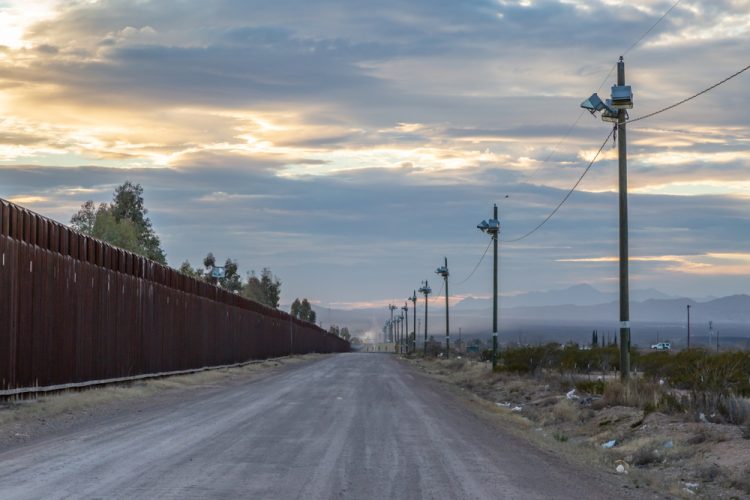Trump promised to finish the border wall on Day One.
But he’s running into unexpected resistance from an unlikely source.
And Texas landowners just hit Trump’s border wall with legal challenges that could derail his timeline.
Lawsuits pile up against Trump’s border wall push
President Trump’s aggressive push to complete his signature border wall is facing a barrage of legal challenges from Texas property owners who refuse to give up their land.
Multiple landowners in Starr County have hired lawyers and filed court challenges against the Trump administration’s eminent domain seizures.
These legal battles could significantly slow down Trump’s border wall construction timeline just as he’s trying to deliver on his signature campaign promise.
The administration has filed dozens of eminent domain lawsuits across Texas, but property owners are fighting back with their own legal arsenal.
Alejo Clarke, who has lived in Starr County for 58 years, is leading the charge against Trump’s land grab.
The administration wants one acre of Clarke’s property to build an 18-foot border wall section.
But Clarke has lawyered up and is taking the fight to federal court.
"I’m not gonna beat Trump – you know it and I know it," Clarke told the Wall Street Journal. "But if someone is going to kick your butt, are you just going to lie down?"
Clarke tried to fight similar seizures during Trump’s first term representing himself, but quickly realized he was outmatched by federal attorneys.
This time he’s hired professional legal help – creating another expensive legal battle the Trump administration will have to fight.
Property owners claim Trump’s wall violates their rights
The legal challenges aren’t just about money – they’re about fundamental property rights that could set precedents for future government seizures.
Raquel Oliva’s family has worked the same Texas land since 1798, predating Texas statehood by decades.
The Trump administration filed proceedings in February to seize less than three acres of the Oliva family property for wall construction.
But Oliva argues the seizure would effectively steal more than 100 acres by cutting off access to land where her family has hunted, farmed, and operated gas wells for generations.
The 75-year-old has filed detailed objections demanding a 16-foot access gate, irrigation pipeline access, and significantly more compensation.
"No one has a problem stopping illegal immigration or drugs, but we live on the border – it’s always been like this," Oliva said. "Now it feels like an invasion of the government on us."
Her legal team is arguing the seizures go far beyond what’s necessary for border security and constitute an unconstitutional taking of private property.
Legal roadblocks could delay Trump’s border security timeline
These court challenges present a serious obstacle to Trump’s ambitious border wall completion schedule.
The eminent domain cases are legally complex because they involve small patches of land with generations of owners and poorly documented titles.
Some cases list upwards of 100 defendants who have ownership claims over tiny pockets of land, while others list "unknown heirs" of deceased former owners.
Each case requires extensive legal proceedings that could drag on for months or even years.
Clarke’s previous legal battle during Trump’s first term lasted the entire administration – and the Biden team ultimately returned his land rather than continue the fight.
Now Trump’s lawyers have to start over with new cases while property owners come armed with better legal representation.
Sources close to the situation say the administration views these cases as necessary legal hurdles rather than insurmountable obstacles.
Department of Homeland Security Secretary Kristi Noem has made border wall completion a centerpiece of the administration’s immigration enforcement strategy.
"Successful mass deportations mean nothing if we don’t control the border and keep future illegal aliens out," Noem wrote in a New York Post opinion column.¹
But if property owners successfully tie up wall construction in court, it could undermine the entire immigration enforcement timeline.
What the legal challenges mean for border security
The Trump administration has already conducted 239,000 deportations this year while ramping up Immigration and Customs Enforcement hiring.²
But the border wall lawsuits reveal a critical vulnerability in Trump’s immigration strategy.
Unlike executive orders that can be implemented immediately, physical border wall construction requires seizing private property – and property owners have constitutional rights that can’t be swept aside.
The legal challenges force Trump’s team to fight on multiple fronts simultaneously.
They have to win in court against individual property owners while also managing the broader construction project across hundreds of miles of border territory.
Each successful legal challenge by property owners sets a precedent that could encourage more landowners to file similar lawsuits.
The irony is that many of these property owners actually support Trump’s border security mission – they just don’t want to sacrifice their family lands to achieve it.
Clarke captured the dilemma perfectly: "This is the piece they want to take out of me. My entrance y todo."
These aren’t leftist activists trying to sabotage Trump’s agenda – they’re Texas property owners defending constitutional rights that conservatives traditionally champion.
Here’s the political reality Trump faces: his base expects results, but these Texas property owners aren’t backing down without a fight.
Administration insiders know the clock is ticking. Every month these cases drag on is another month Democrats can point to unfulfilled promises.
The smart money says Trump’s legal team will push for quick settlements rather than risk lengthy court battles that could stretch into 2026.
But if these landowners dig in their heels, Trump could find himself explaining to voters why the wall that was supposed to be "so easy" is stuck in the same bureaucratic mess that’s paralyzed Washington for decades.
¹ Kristi Noem, "Border Wall Completion Crucial for National Security," New York Post, 2025.
² Staff Report, "Trump Administration Deportation Data," The Washington Post, July 2025.















